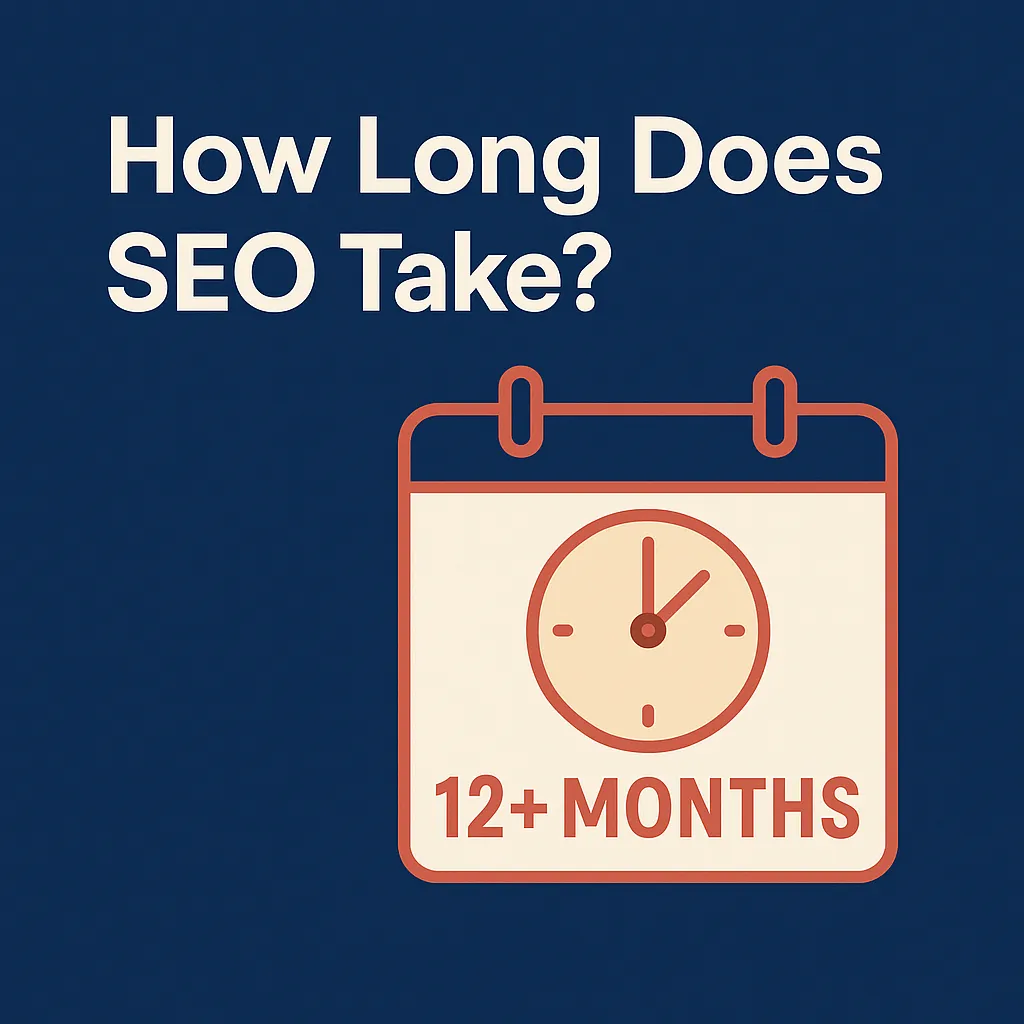
How Long Does SEO Take… And Why?
If you've ever typed “how long does SEO take” into Google, you’ve probably seen answers ranging from a few weeks to over a year. Some agencies promise quick wins in 90 days. Others say six months is enough. But the truth, the real, unvarnished truth, is that good SEO takes 12 months minimum to see stable, meaningful results.
And that’s not a marketing tactic. That’s physics.
Let’s break down why.
Why SEO Takes So Long
1. Google Doesn’t Trust New Changes Immediately
Google doesn’t operate on blind faith. It doesn’t just see a new website or a fresh piece of content and assume it’s good. It takes time for Google’s algorithm to:
Crawl your pages
Understand what they’re about
Monitor how users interact with them
See if other reputable sites reference them
Compare your site’s relevance and authority to competitors
Even after content is published, it can take up to a month to get indexed and months to stabilize in rankings. That’s by design. Google wants to observe before it rewards.
2. Your Website Has a Reputation Score… And It’s Probably Lower Than You Want it to be
Your website has something akin to a credit score in Google's eyes. It’s often referred to as “Domain Authority” or “Trust.”
If your site is new, it’s like having no credit history. If your site has been around but hasn’t earned many backlinks or posted consistent content, your authority is low.
You can publish brilliant content, but if your site isn’t trusted yet, Google won’t put you on the front page.
To fix that, you need:
Time
Consistent content
High-quality backlinks
Clean technical SEO
And just like compound interest, all of that grows slowly until it becomes unstoppable. That’s why most domains don’t see major traffic gains until 12–18 months in.
3. SEO Is a Game of Compounding Returns
Most traffic growth from SEO doesn't happen linearly. You don’t publish 5 blog posts a month and get 5x the traffic next month.
Instead, results snowball.
(The following example is a hypothetical, not guaranteed timeline for outcomes)
Month 1–3: You’re laying technical groundwork, fixing site speed, cleaning up errors, and producing your first batch of content. Google hasn’t even indexed some pages yet.
Month 4–6: Your best posts start climbing slowly. A few low-competition keywords may rank.
Month 7–9: You earn your first backlinks. Google starts trusting your site a little more. Rankings begin to shift in your favor.
Month 10–12: A few pages break into page 1. Your domain authority rises. Past content starts pulling more weight. And new content ranks faster because of it.
It’s not until around the 12-month mark that most websites hit their stride. That’s when SEO becomes a machine and the momentum we’ve been building starts to pay off.
4. You’re Competing Against Giants
Here’s the reality: You’re not trying to rank in a vacuum. You’re trying to outrank other sites.
Many of them:
Have been investing in SEO for 5+ years
Have thousands of backlinks
Post weekly (or daily)
Have entire teams dedicated to SEO
You can’t expect to dethrone those sites in 3 months.
Even local businesses face stiff competition. If the top 3 spots in your area are held by companies with hundreds of 5-star reviews, active Google Business Profiles, and regular blog content, it’ll take serious work to catch up.
You’re not just trying to be good. You’re trying to be better than whoever currently holds the spot you want. And if they’re strong? That takes time.
5. There’s a Lag Between Implementation and Impact
SEO is not like ads. With paid ads, you turn on the faucet and leads start dripping. Turn it off and they stop. But with SEO, there’s a delay between effort and outcome.
Example:
You publish a blog post in January.
It gets indexed in February.
It slowly climbs rankings in March and April.
It starts getting traffic in May.
It earns backlinks in June.
It breaks into the top 10 in July.
That’s a 6–7 month lag for a single page.
This is normal. And it’s why judging an SEO strategy after 60 or 90 days is like judging a workout program after your first trip to the gym. You're just getting started.
What Happens if You Stop Too Soon
Here’s the worst part: most businesses quit SEO right before the results kick in… They invest for 3–6 months, don’t see instant results, and walk away. But what they don’t realize is:
Most of the work they paid for hasn’t matured yet
They’re 3 months away from compounding gains
Their competitors are still investing and pulling ahead
Quitting SEO early is like planting seeds and then digging them up because you’re impatient. It’s wasteful, expensive, and keeps you stuck in the cycle of short-term marketing tactics.
Why 12+ Months Is the Benchmark
Let’s break this down into practical benchmarks
0–3 months
Technical fixes, keyword research, initial content, site cleanup. No real traffic gains.
4–6 months
First signs of ranking movement. Low-competition terms may hit page 2 or bottom of page 1.
7–9 months
Google starts trusting you more. Existing content rises. Backlinks begin to take effect.
10–12 months
Some terms break into top 10. Organic leads begin. Momentum builds. New content ranks faster.
12–18 months
SEO snowball. Brand authority rises. Google rewards consistency. You start to dominate. You start to see terms in the top 3.
This is a general timeline. For brand-new websites, it may take even longer. For local businesses with less competition, it might be a little faster. But 12 months is the minimum timeline you should plan for if you want long-term, compounding results that make paid ads look like a money pit.
So... Is SEO Worth It?
Yes. And here’s why.
While SEO is slow to start, it’s one of the highest ROI marketing investments you can make. Unlike ads that stop working the second you stop paying, SEO compounds.
You get:
Evergreen traffic
Higher close rates (because people searched for you)
Lower long-term costs
Stronger brand authority
A digital moat that’s hard to replicate
But only if you stick with it long enough.
Final Word: SEO Is Like Farming
Think of SEO like farming.
You plow the field, plant the seeds, water them, and wait. Nothing happens for a while. Then, almost all at once, it blooms. And once the crops come in, they feed your business for years.
If you want fast results… don’t invest in SEO.
If you aren’t sure if you’re going to be around in a year… don’t invest in SEO.
If you’re not willing to be patient and make long term investments… don’t invest in SEO.
BUT
If you want forever results… commit to SEO.
If you plan on being an industry leader in 5 years… commit to SEO.
If you want to make a lot of money for a long time… commit to SEO.
And “Commit” means “Give it at least 12 months.”
Anything less, and you’re setting yourself up for frustration.
But if you stay the course? You’ll wonder why you didn’t start sooner.

